Entrepreneurship & Small Business Management: Comprehensive Analysis
VerifiedAdded on 2023/01/13
|18
|5433
|44
Report
AI Summary
This report provides a comprehensive analysis of entrepreneurship and small business management, beginning with a discussion of the different types of entrepreneurial ventures, including small business entrepreneurship, scalable start-up entrepreneurship, large company entrepreneurship, and social entrepreneurship, and their relation to the typology of entrepreneurship, which includes survival firms, lifestyle firms, managed growth firms, and aggressive growth firms. It explores the similarities and differences between these ventures, focusing on objectives, profit earned, and market share. Furthermore, the report examines the impact of micro and small businesses on the economy, highlighting their role in enhancing income and reducing costs. It also discusses the characteristic traits and skills of successful entrepreneurs, differentiating them from managers, and analyzes how entrepreneurial personalities reflect motivation and mindset. Finally, the report considers different environments that either foster or hinder entrepreneurship, providing a holistic view of the entrepreneurial landscape. Desklib provides access to similar reports and study tools for students.

Entrepreneurship and Small
Business Management
Business Management
Paraphrase This Document
Need a fresh take? Get an instant paraphrase of this document with our AI Paraphraser
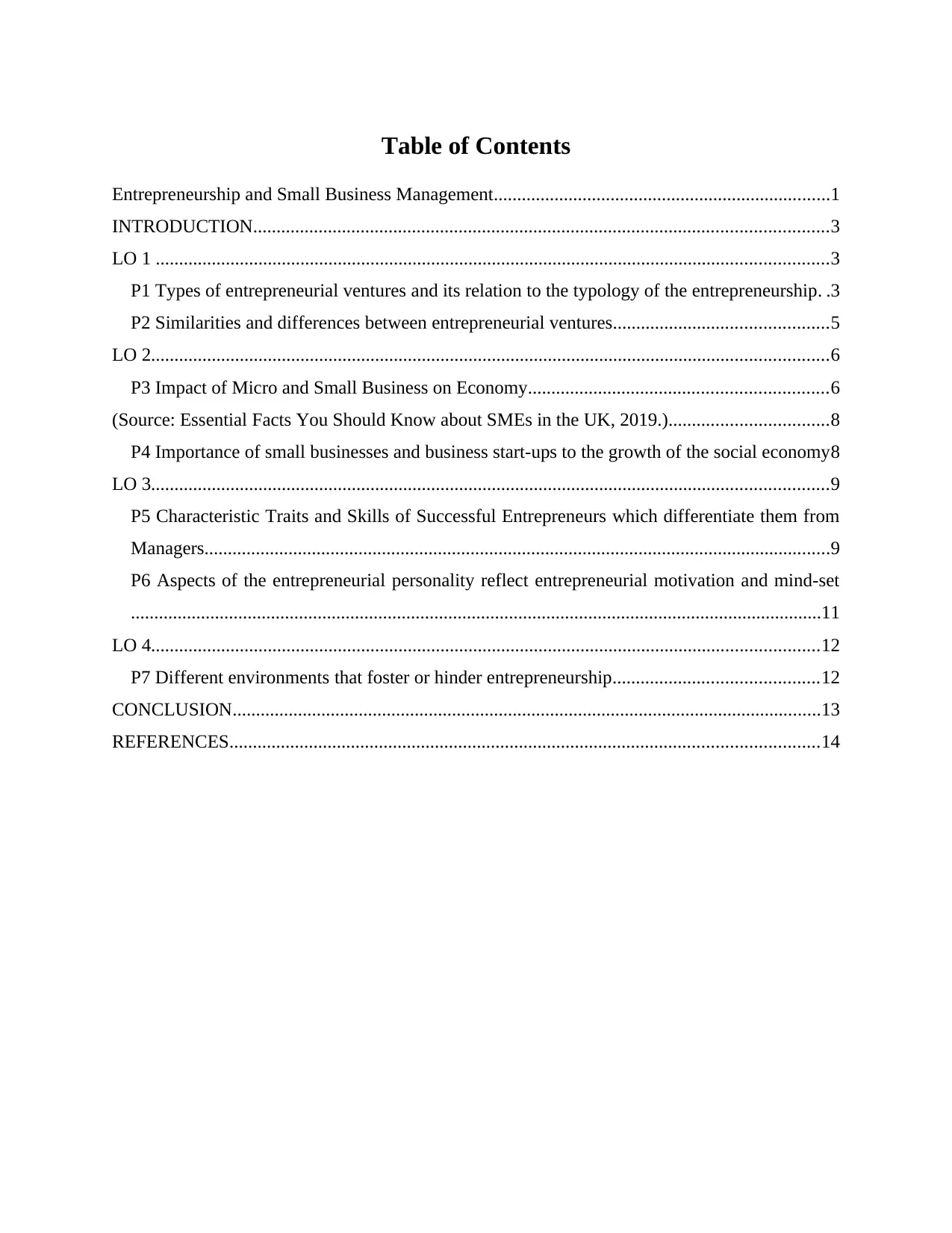
Table of Contents
Entrepreneurship and Small Business Management........................................................................1
INTRODUCTION...........................................................................................................................3
LO 1 ................................................................................................................................................3
P1 Types of entrepreneurial ventures and its relation to the typology of the entrepreneurship. .3
P2 Similarities and differences between entrepreneurial ventures..............................................5
LO 2.................................................................................................................................................6
P3 Impact of Micro and Small Business on Economy................................................................6
(Source: Essential Facts You Should Know about SMEs in the UK, 2019.)..................................8
P4 Importance of small businesses and business start-ups to the growth of the social economy8
LO 3.................................................................................................................................................9
P5 Characteristic Traits and Skills of Successful Entrepreneurs which differentiate them from
Managers......................................................................................................................................9
P6 Aspects of the entrepreneurial personality reflect entrepreneurial motivation and mind-set
....................................................................................................................................................11
LO 4...............................................................................................................................................12
P7 Different environments that foster or hinder entrepreneurship............................................12
CONCLUSION..............................................................................................................................13
REFERENCES..............................................................................................................................14
Entrepreneurship and Small Business Management........................................................................1
INTRODUCTION...........................................................................................................................3
LO 1 ................................................................................................................................................3
P1 Types of entrepreneurial ventures and its relation to the typology of the entrepreneurship. .3
P2 Similarities and differences between entrepreneurial ventures..............................................5
LO 2.................................................................................................................................................6
P3 Impact of Micro and Small Business on Economy................................................................6
(Source: Essential Facts You Should Know about SMEs in the UK, 2019.)..................................8
P4 Importance of small businesses and business start-ups to the growth of the social economy8
LO 3.................................................................................................................................................9
P5 Characteristic Traits and Skills of Successful Entrepreneurs which differentiate them from
Managers......................................................................................................................................9
P6 Aspects of the entrepreneurial personality reflect entrepreneurial motivation and mind-set
....................................................................................................................................................11
LO 4...............................................................................................................................................12
P7 Different environments that foster or hinder entrepreneurship............................................12
CONCLUSION..............................................................................................................................13
REFERENCES..............................................................................................................................14
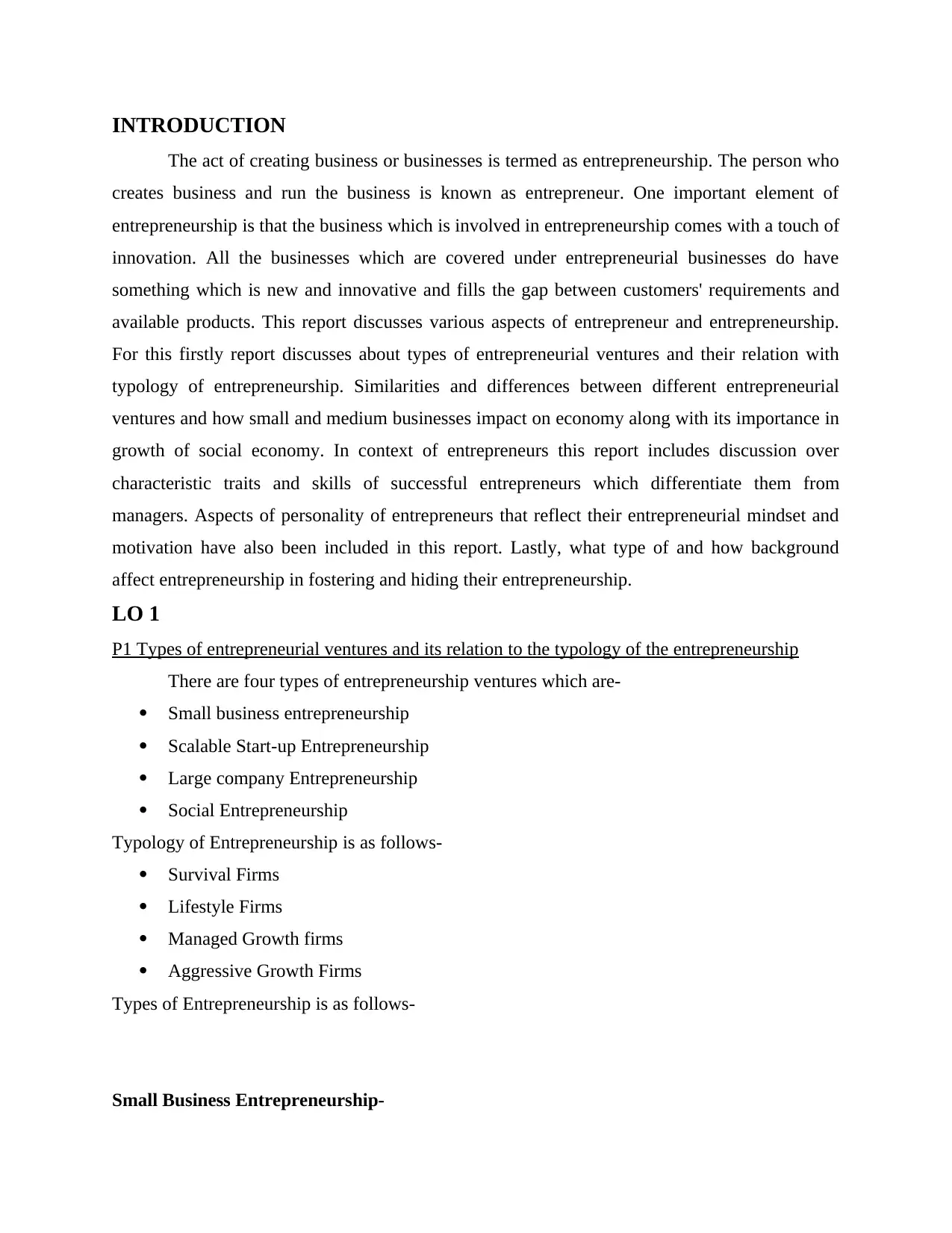
INTRODUCTION
The act of creating business or businesses is termed as entrepreneurship. The person who
creates business and run the business is known as entrepreneur. One important element of
entrepreneurship is that the business which is involved in entrepreneurship comes with a touch of
innovation. All the businesses which are covered under entrepreneurial businesses do have
something which is new and innovative and fills the gap between customers' requirements and
available products. This report discusses various aspects of entrepreneur and entrepreneurship.
For this firstly report discusses about types of entrepreneurial ventures and their relation with
typology of entrepreneurship. Similarities and differences between different entrepreneurial
ventures and how small and medium businesses impact on economy along with its importance in
growth of social economy. In context of entrepreneurs this report includes discussion over
characteristic traits and skills of successful entrepreneurs which differentiate them from
managers. Aspects of personality of entrepreneurs that reflect their entrepreneurial mindset and
motivation have also been included in this report. Lastly, what type of and how background
affect entrepreneurship in fostering and hiding their entrepreneurship.
LO 1
P1 Types of entrepreneurial ventures and its relation to the typology of the entrepreneurship
There are four types of entrepreneurship ventures which are-
Small business entrepreneurship
Scalable Start-up Entrepreneurship
Large company Entrepreneurship
Social Entrepreneurship
Typology of Entrepreneurship is as follows-
Survival Firms
Lifestyle Firms
Managed Growth firms
Aggressive Growth Firms
Types of Entrepreneurship is as follows-
Small Business Entrepreneurship-
The act of creating business or businesses is termed as entrepreneurship. The person who
creates business and run the business is known as entrepreneur. One important element of
entrepreneurship is that the business which is involved in entrepreneurship comes with a touch of
innovation. All the businesses which are covered under entrepreneurial businesses do have
something which is new and innovative and fills the gap between customers' requirements and
available products. This report discusses various aspects of entrepreneur and entrepreneurship.
For this firstly report discusses about types of entrepreneurial ventures and their relation with
typology of entrepreneurship. Similarities and differences between different entrepreneurial
ventures and how small and medium businesses impact on economy along with its importance in
growth of social economy. In context of entrepreneurs this report includes discussion over
characteristic traits and skills of successful entrepreneurs which differentiate them from
managers. Aspects of personality of entrepreneurs that reflect their entrepreneurial mindset and
motivation have also been included in this report. Lastly, what type of and how background
affect entrepreneurship in fostering and hiding their entrepreneurship.
LO 1
P1 Types of entrepreneurial ventures and its relation to the typology of the entrepreneurship
There are four types of entrepreneurship ventures which are-
Small business entrepreneurship
Scalable Start-up Entrepreneurship
Large company Entrepreneurship
Social Entrepreneurship
Typology of Entrepreneurship is as follows-
Survival Firms
Lifestyle Firms
Managed Growth firms
Aggressive Growth Firms
Types of Entrepreneurship is as follows-
Small Business Entrepreneurship-
⊘ This is a preview!⊘
Do you want full access?
Subscribe today to unlock all pages.

Trusted by 1+ million students worldwide
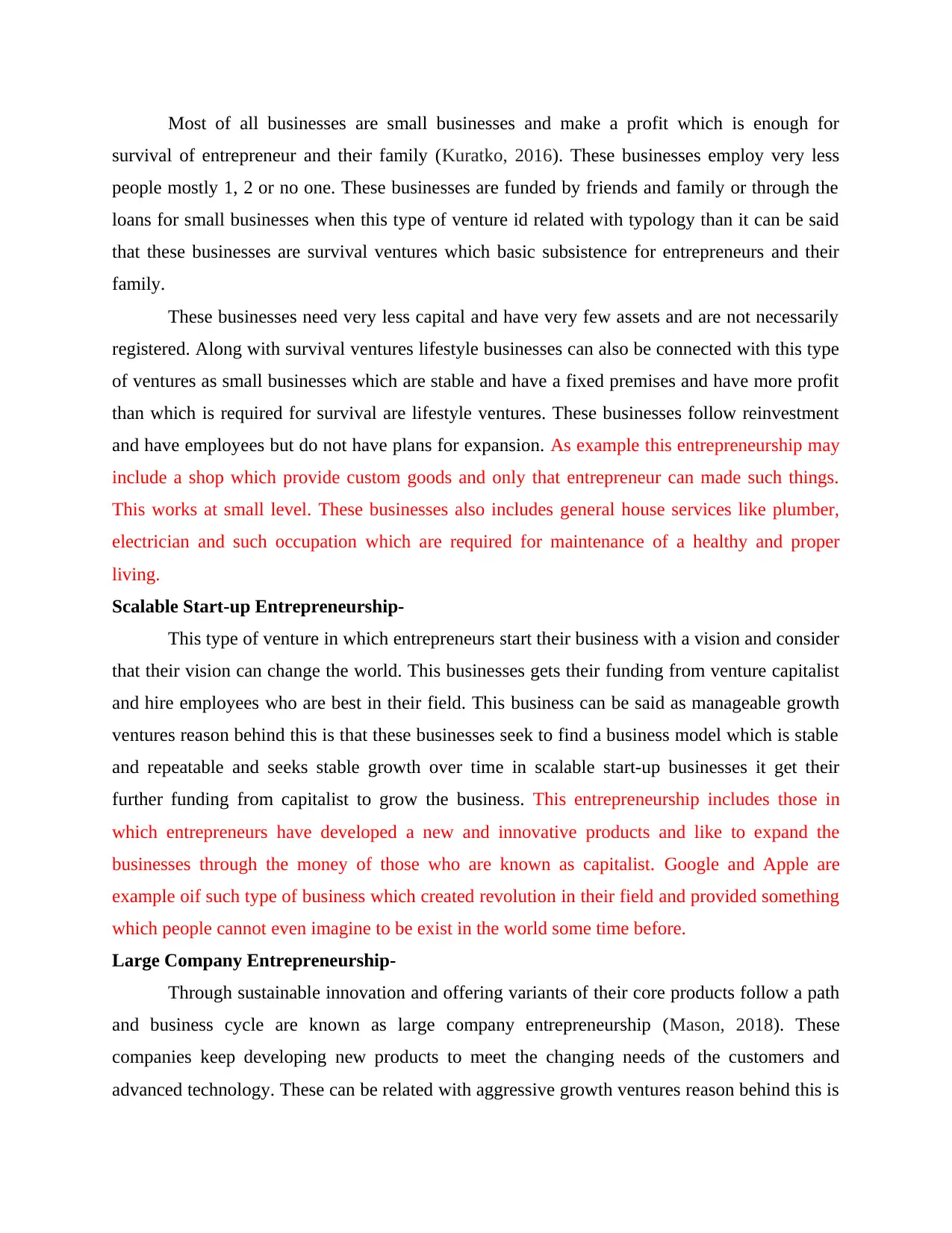
Most of all businesses are small businesses and make a profit which is enough for
survival of entrepreneur and their family (Kuratko, 2016). These businesses employ very less
people mostly 1, 2 or no one. These businesses are funded by friends and family or through the
loans for small businesses when this type of venture id related with typology than it can be said
that these businesses are survival ventures which basic subsistence for entrepreneurs and their
family.
These businesses need very less capital and have very few assets and are not necessarily
registered. Along with survival ventures lifestyle businesses can also be connected with this type
of ventures as small businesses which are stable and have a fixed premises and have more profit
than which is required for survival are lifestyle ventures. These businesses follow reinvestment
and have employees but do not have plans for expansion. As example this entrepreneurship may
include a shop which provide custom goods and only that entrepreneur can made such things.
This works at small level. These businesses also includes general house services like plumber,
electrician and such occupation which are required for maintenance of a healthy and proper
living.
Scalable Start-up Entrepreneurship-
This type of venture in which entrepreneurs start their business with a vision and consider
that their vision can change the world. This businesses gets their funding from venture capitalist
and hire employees who are best in their field. This business can be said as manageable growth
ventures reason behind this is that these businesses seek to find a business model which is stable
and repeatable and seeks stable growth over time in scalable start-up businesses it get their
further funding from capitalist to grow the business. This entrepreneurship includes those in
which entrepreneurs have developed a new and innovative products and like to expand the
businesses through the money of those who are known as capitalist. Google and Apple are
example oif such type of business which created revolution in their field and provided something
which people cannot even imagine to be exist in the world some time before.
Large Company Entrepreneurship-
Through sustainable innovation and offering variants of their core products follow a path
and business cycle are known as large company entrepreneurship (Mason, 2018). These
companies keep developing new products to meet the changing needs of the customers and
advanced technology. These can be related with aggressive growth ventures reason behind this is
survival of entrepreneur and their family (Kuratko, 2016). These businesses employ very less
people mostly 1, 2 or no one. These businesses are funded by friends and family or through the
loans for small businesses when this type of venture id related with typology than it can be said
that these businesses are survival ventures which basic subsistence for entrepreneurs and their
family.
These businesses need very less capital and have very few assets and are not necessarily
registered. Along with survival ventures lifestyle businesses can also be connected with this type
of ventures as small businesses which are stable and have a fixed premises and have more profit
than which is required for survival are lifestyle ventures. These businesses follow reinvestment
and have employees but do not have plans for expansion. As example this entrepreneurship may
include a shop which provide custom goods and only that entrepreneur can made such things.
This works at small level. These businesses also includes general house services like plumber,
electrician and such occupation which are required for maintenance of a healthy and proper
living.
Scalable Start-up Entrepreneurship-
This type of venture in which entrepreneurs start their business with a vision and consider
that their vision can change the world. This businesses gets their funding from venture capitalist
and hire employees who are best in their field. This business can be said as manageable growth
ventures reason behind this is that these businesses seek to find a business model which is stable
and repeatable and seeks stable growth over time in scalable start-up businesses it get their
further funding from capitalist to grow the business. This entrepreneurship includes those in
which entrepreneurs have developed a new and innovative products and like to expand the
businesses through the money of those who are known as capitalist. Google and Apple are
example oif such type of business which created revolution in their field and provided something
which people cannot even imagine to be exist in the world some time before.
Large Company Entrepreneurship-
Through sustainable innovation and offering variants of their core products follow a path
and business cycle are known as large company entrepreneurship (Mason, 2018). These
companies keep developing new products to meet the changing needs of the customers and
advanced technology. These can be related with aggressive growth ventures reason behind this is
Paraphrase This Document
Need a fresh take? Get an instant paraphrase of this document with our AI Paraphraser
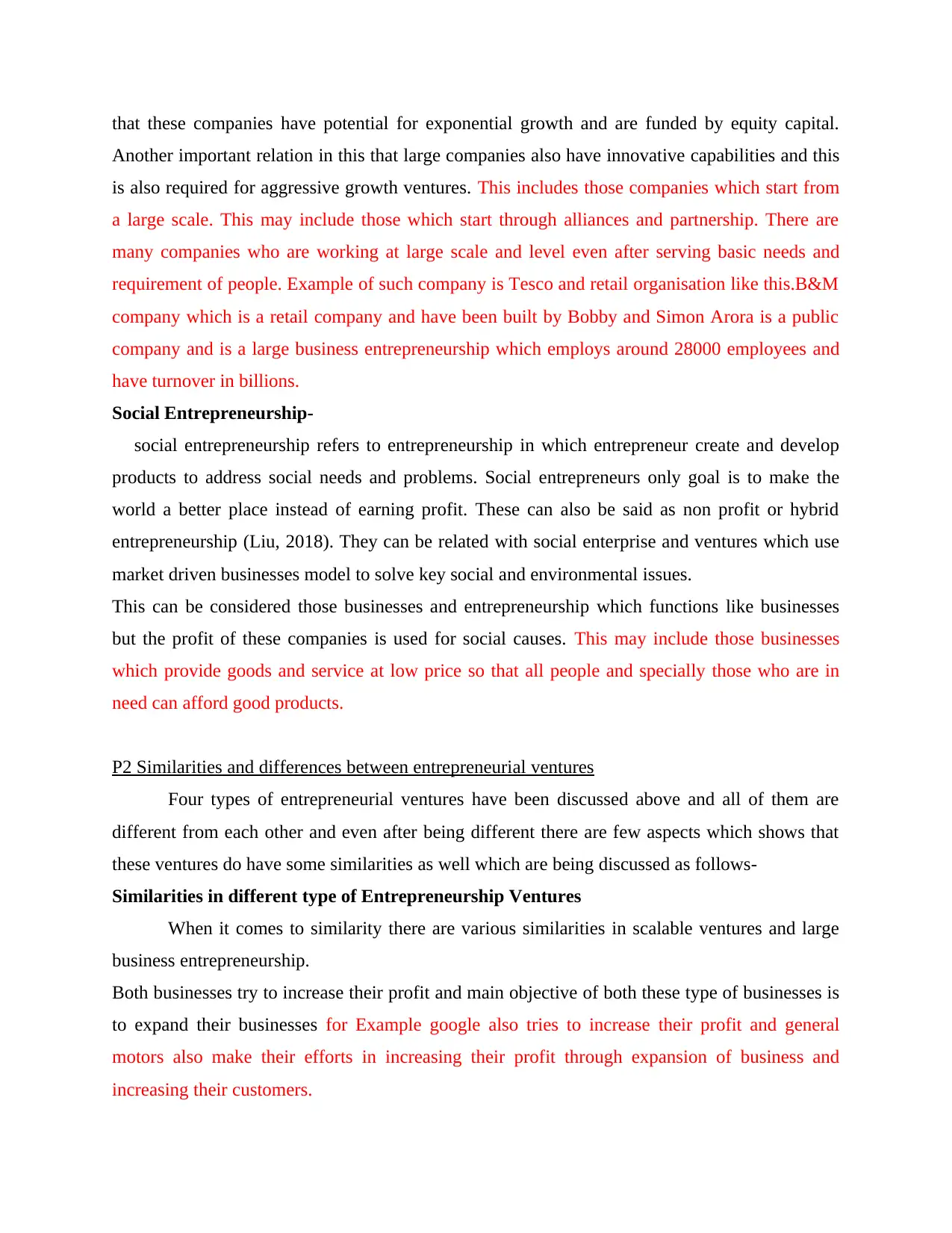
that these companies have potential for exponential growth and are funded by equity capital.
Another important relation in this that large companies also have innovative capabilities and this
is also required for aggressive growth ventures. This includes those companies which start from
a large scale. This may include those which start through alliances and partnership. There are
many companies who are working at large scale and level even after serving basic needs and
requirement of people. Example of such company is Tesco and retail organisation like this.B&M
company which is a retail company and have been built by Bobby and Simon Arora is a public
company and is a large business entrepreneurship which employs around 28000 employees and
have turnover in billions.
Social Entrepreneurship-
social entrepreneurship refers to entrepreneurship in which entrepreneur create and develop
products to address social needs and problems. Social entrepreneurs only goal is to make the
world a better place instead of earning profit. These can also be said as non profit or hybrid
entrepreneurship (Liu, 2018). They can be related with social enterprise and ventures which use
market driven businesses model to solve key social and environmental issues.
This can be considered those businesses and entrepreneurship which functions like businesses
but the profit of these companies is used for social causes. This may include those businesses
which provide goods and service at low price so that all people and specially those who are in
need can afford good products.
P2 Similarities and differences between entrepreneurial ventures
Four types of entrepreneurial ventures have been discussed above and all of them are
different from each other and even after being different there are few aspects which shows that
these ventures do have some similarities as well which are being discussed as follows-
Similarities in different type of Entrepreneurship Ventures
When it comes to similarity there are various similarities in scalable ventures and large
business entrepreneurship.
Both businesses try to increase their profit and main objective of both these type of businesses is
to expand their businesses for Example google also tries to increase their profit and general
motors also make their efforts in increasing their profit through expansion of business and
increasing their customers.
Another important relation in this that large companies also have innovative capabilities and this
is also required for aggressive growth ventures. This includes those companies which start from
a large scale. This may include those which start through alliances and partnership. There are
many companies who are working at large scale and level even after serving basic needs and
requirement of people. Example of such company is Tesco and retail organisation like this.B&M
company which is a retail company and have been built by Bobby and Simon Arora is a public
company and is a large business entrepreneurship which employs around 28000 employees and
have turnover in billions.
Social Entrepreneurship-
social entrepreneurship refers to entrepreneurship in which entrepreneur create and develop
products to address social needs and problems. Social entrepreneurs only goal is to make the
world a better place instead of earning profit. These can also be said as non profit or hybrid
entrepreneurship (Liu, 2018). They can be related with social enterprise and ventures which use
market driven businesses model to solve key social and environmental issues.
This can be considered those businesses and entrepreneurship which functions like businesses
but the profit of these companies is used for social causes. This may include those businesses
which provide goods and service at low price so that all people and specially those who are in
need can afford good products.
P2 Similarities and differences between entrepreneurial ventures
Four types of entrepreneurial ventures have been discussed above and all of them are
different from each other and even after being different there are few aspects which shows that
these ventures do have some similarities as well which are being discussed as follows-
Similarities in different type of Entrepreneurship Ventures
When it comes to similarity there are various similarities in scalable ventures and large
business entrepreneurship.
Both businesses try to increase their profit and main objective of both these type of businesses is
to expand their businesses for Example google also tries to increase their profit and general
motors also make their efforts in increasing their profit through expansion of business and
increasing their customers.
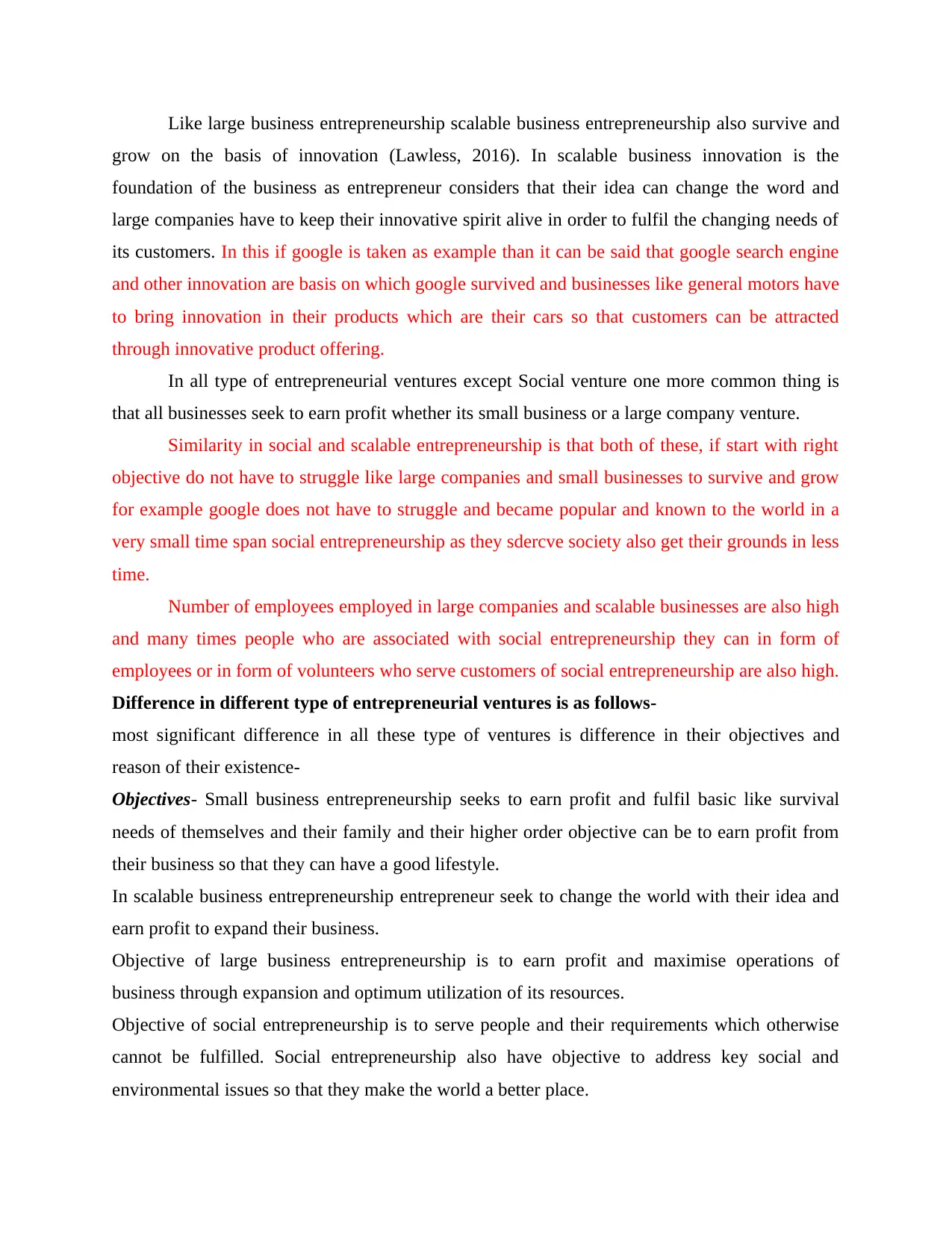
Like large business entrepreneurship scalable business entrepreneurship also survive and
grow on the basis of innovation (Lawless, 2016). In scalable business innovation is the
foundation of the business as entrepreneur considers that their idea can change the word and
large companies have to keep their innovative spirit alive in order to fulfil the changing needs of
its customers. In this if google is taken as example than it can be said that google search engine
and other innovation are basis on which google survived and businesses like general motors have
to bring innovation in their products which are their cars so that customers can be attracted
through innovative product offering.
In all type of entrepreneurial ventures except Social venture one more common thing is
that all businesses seek to earn profit whether its small business or a large company venture.
Similarity in social and scalable entrepreneurship is that both of these, if start with right
objective do not have to struggle like large companies and small businesses to survive and grow
for example google does not have to struggle and became popular and known to the world in a
very small time span social entrepreneurship as they sdercve society also get their grounds in less
time.
Number of employees employed in large companies and scalable businesses are also high
and many times people who are associated with social entrepreneurship they can in form of
employees or in form of volunteers who serve customers of social entrepreneurship are also high.
Difference in different type of entrepreneurial ventures is as follows-
most significant difference in all these type of ventures is difference in their objectives and
reason of their existence-
Objectives- Small business entrepreneurship seeks to earn profit and fulfil basic like survival
needs of themselves and their family and their higher order objective can be to earn profit from
their business so that they can have a good lifestyle.
In scalable business entrepreneurship entrepreneur seek to change the world with their idea and
earn profit to expand their business.
Objective of large business entrepreneurship is to earn profit and maximise operations of
business through expansion and optimum utilization of its resources.
Objective of social entrepreneurship is to serve people and their requirements which otherwise
cannot be fulfilled. Social entrepreneurship also have objective to address key social and
environmental issues so that they make the world a better place.
grow on the basis of innovation (Lawless, 2016). In scalable business innovation is the
foundation of the business as entrepreneur considers that their idea can change the word and
large companies have to keep their innovative spirit alive in order to fulfil the changing needs of
its customers. In this if google is taken as example than it can be said that google search engine
and other innovation are basis on which google survived and businesses like general motors have
to bring innovation in their products which are their cars so that customers can be attracted
through innovative product offering.
In all type of entrepreneurial ventures except Social venture one more common thing is
that all businesses seek to earn profit whether its small business or a large company venture.
Similarity in social and scalable entrepreneurship is that both of these, if start with right
objective do not have to struggle like large companies and small businesses to survive and grow
for example google does not have to struggle and became popular and known to the world in a
very small time span social entrepreneurship as they sdercve society also get their grounds in less
time.
Number of employees employed in large companies and scalable businesses are also high
and many times people who are associated with social entrepreneurship they can in form of
employees or in form of volunteers who serve customers of social entrepreneurship are also high.
Difference in different type of entrepreneurial ventures is as follows-
most significant difference in all these type of ventures is difference in their objectives and
reason of their existence-
Objectives- Small business entrepreneurship seeks to earn profit and fulfil basic like survival
needs of themselves and their family and their higher order objective can be to earn profit from
their business so that they can have a good lifestyle.
In scalable business entrepreneurship entrepreneur seek to change the world with their idea and
earn profit to expand their business.
Objective of large business entrepreneurship is to earn profit and maximise operations of
business through expansion and optimum utilization of its resources.
Objective of social entrepreneurship is to serve people and their requirements which otherwise
cannot be fulfilled. Social entrepreneurship also have objective to address key social and
environmental issues so that they make the world a better place.
⊘ This is a preview!⊘
Do you want full access?
Subscribe today to unlock all pages.

Trusted by 1+ million students worldwide
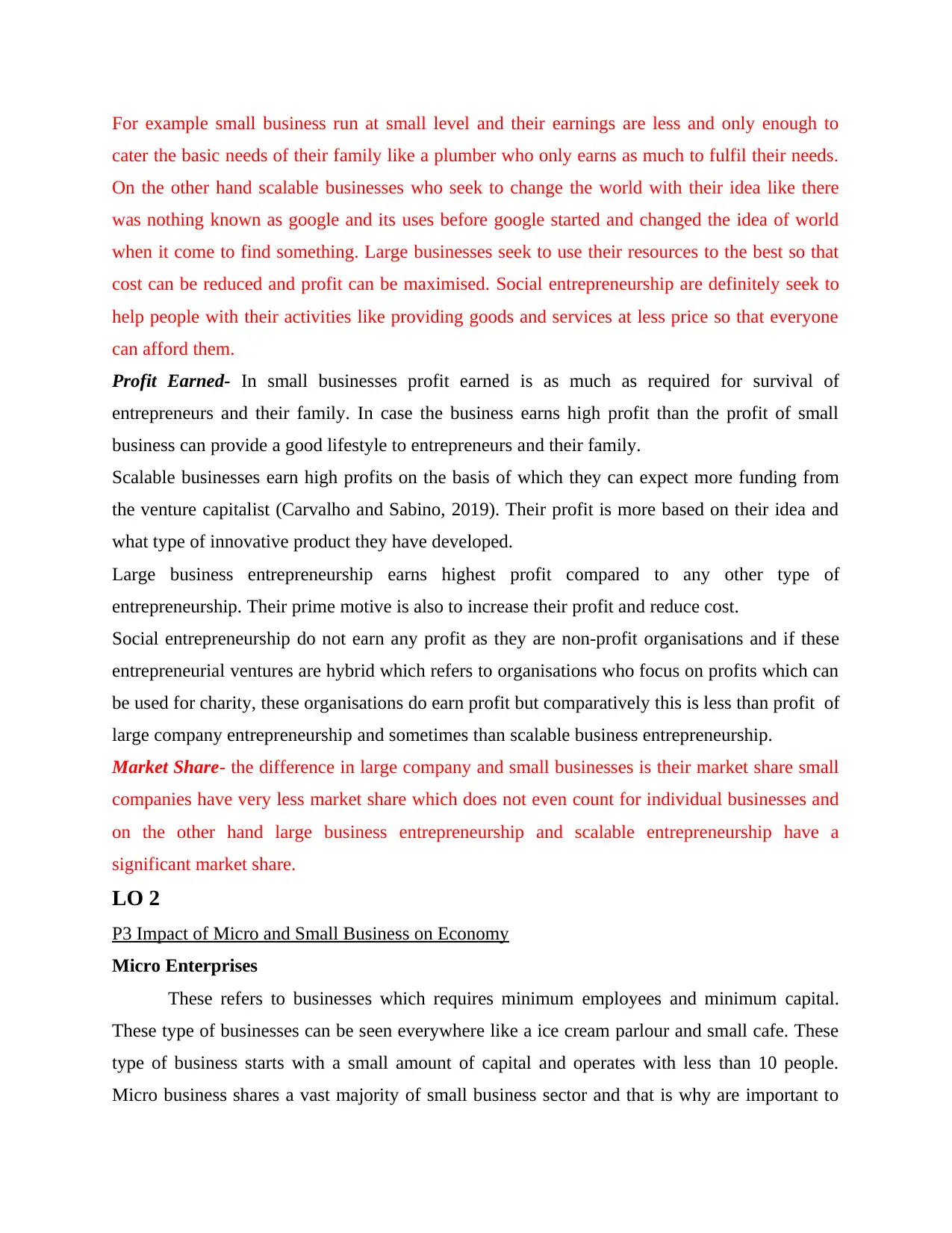
For example small business run at small level and their earnings are less and only enough to
cater the basic needs of their family like a plumber who only earns as much to fulfil their needs.
On the other hand scalable businesses who seek to change the world with their idea like there
was nothing known as google and its uses before google started and changed the idea of world
when it come to find something. Large businesses seek to use their resources to the best so that
cost can be reduced and profit can be maximised. Social entrepreneurship are definitely seek to
help people with their activities like providing goods and services at less price so that everyone
can afford them.
Profit Earned- In small businesses profit earned is as much as required for survival of
entrepreneurs and their family. In case the business earns high profit than the profit of small
business can provide a good lifestyle to entrepreneurs and their family.
Scalable businesses earn high profits on the basis of which they can expect more funding from
the venture capitalist (Carvalho and Sabino, 2019). Their profit is more based on their idea and
what type of innovative product they have developed.
Large business entrepreneurship earns highest profit compared to any other type of
entrepreneurship. Their prime motive is also to increase their profit and reduce cost.
Social entrepreneurship do not earn any profit as they are non-profit organisations and if these
entrepreneurial ventures are hybrid which refers to organisations who focus on profits which can
be used for charity, these organisations do earn profit but comparatively this is less than profit of
large company entrepreneurship and sometimes than scalable business entrepreneurship.
Market Share- the difference in large company and small businesses is their market share small
companies have very less market share which does not even count for individual businesses and
on the other hand large business entrepreneurship and scalable entrepreneurship have a
significant market share.
LO 2
P3 Impact of Micro and Small Business on Economy
Micro Enterprises
These refers to businesses which requires minimum employees and minimum capital.
These type of businesses can be seen everywhere like a ice cream parlour and small cafe. These
type of business starts with a small amount of capital and operates with less than 10 people.
Micro business shares a vast majority of small business sector and that is why are important to
cater the basic needs of their family like a plumber who only earns as much to fulfil their needs.
On the other hand scalable businesses who seek to change the world with their idea like there
was nothing known as google and its uses before google started and changed the idea of world
when it come to find something. Large businesses seek to use their resources to the best so that
cost can be reduced and profit can be maximised. Social entrepreneurship are definitely seek to
help people with their activities like providing goods and services at less price so that everyone
can afford them.
Profit Earned- In small businesses profit earned is as much as required for survival of
entrepreneurs and their family. In case the business earns high profit than the profit of small
business can provide a good lifestyle to entrepreneurs and their family.
Scalable businesses earn high profits on the basis of which they can expect more funding from
the venture capitalist (Carvalho and Sabino, 2019). Their profit is more based on their idea and
what type of innovative product they have developed.
Large business entrepreneurship earns highest profit compared to any other type of
entrepreneurship. Their prime motive is also to increase their profit and reduce cost.
Social entrepreneurship do not earn any profit as they are non-profit organisations and if these
entrepreneurial ventures are hybrid which refers to organisations who focus on profits which can
be used for charity, these organisations do earn profit but comparatively this is less than profit of
large company entrepreneurship and sometimes than scalable business entrepreneurship.
Market Share- the difference in large company and small businesses is their market share small
companies have very less market share which does not even count for individual businesses and
on the other hand large business entrepreneurship and scalable entrepreneurship have a
significant market share.
LO 2
P3 Impact of Micro and Small Business on Economy
Micro Enterprises
These refers to businesses which requires minimum employees and minimum capital.
These type of businesses can be seen everywhere like a ice cream parlour and small cafe. These
type of business starts with a small amount of capital and operates with less than 10 people.
Micro business shares a vast majority of small business sector and that is why are important to
Paraphrase This Document
Need a fresh take? Get an instant paraphrase of this document with our AI Paraphraser
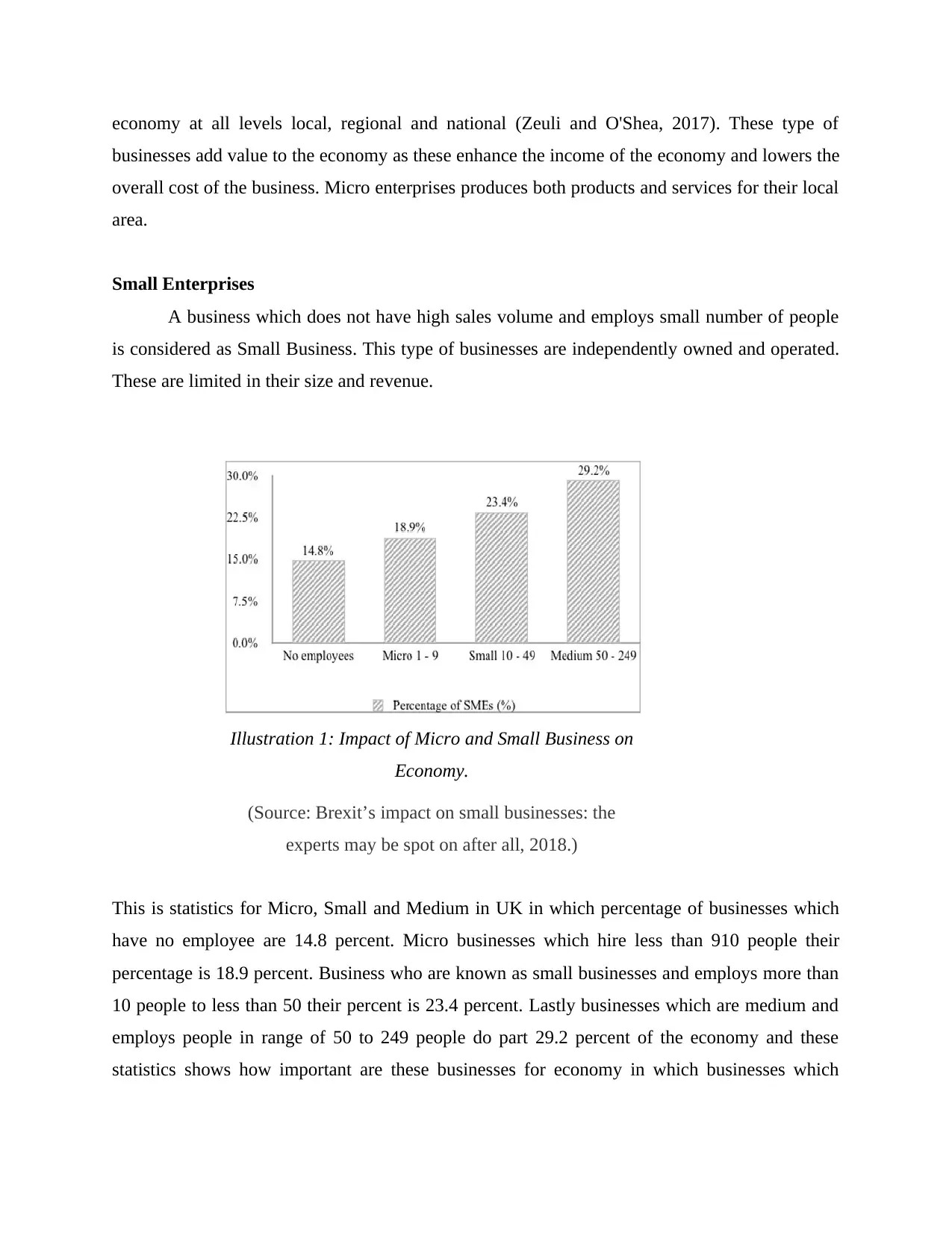
economy at all levels local, regional and national (Zeuli and O'Shea, 2017). These type of
businesses add value to the economy as these enhance the income of the economy and lowers the
overall cost of the business. Micro enterprises produces both products and services for their local
area.
Small Enterprises
A business which does not have high sales volume and employs small number of people
is considered as Small Business. This type of businesses are independently owned and operated.
These are limited in their size and revenue.
This is statistics for Micro, Small and Medium in UK in which percentage of businesses which
have no employee are 14.8 percent. Micro businesses which hire less than 910 people their
percentage is 18.9 percent. Business who are known as small businesses and employs more than
10 people to less than 50 their percent is 23.4 percent. Lastly businesses which are medium and
employs people in range of 50 to 249 people do part 29.2 percent of the economy and these
statistics shows how important are these businesses for economy in which businesses which
Illustration 1: Impact of Micro and Small Business on
Economy.
(Source: Brexit’s impact on small businesses: the
experts may be spot on after all, 2018.)
businesses add value to the economy as these enhance the income of the economy and lowers the
overall cost of the business. Micro enterprises produces both products and services for their local
area.
Small Enterprises
A business which does not have high sales volume and employs small number of people
is considered as Small Business. This type of businesses are independently owned and operated.
These are limited in their size and revenue.
This is statistics for Micro, Small and Medium in UK in which percentage of businesses which
have no employee are 14.8 percent. Micro businesses which hire less than 910 people their
percentage is 18.9 percent. Business who are known as small businesses and employs more than
10 people to less than 50 their percent is 23.4 percent. Lastly businesses which are medium and
employs people in range of 50 to 249 people do part 29.2 percent of the economy and these
statistics shows how important are these businesses for economy in which businesses which
Illustration 1: Impact of Micro and Small Business on
Economy.
(Source: Brexit’s impact on small businesses: the
experts may be spot on after all, 2018.)
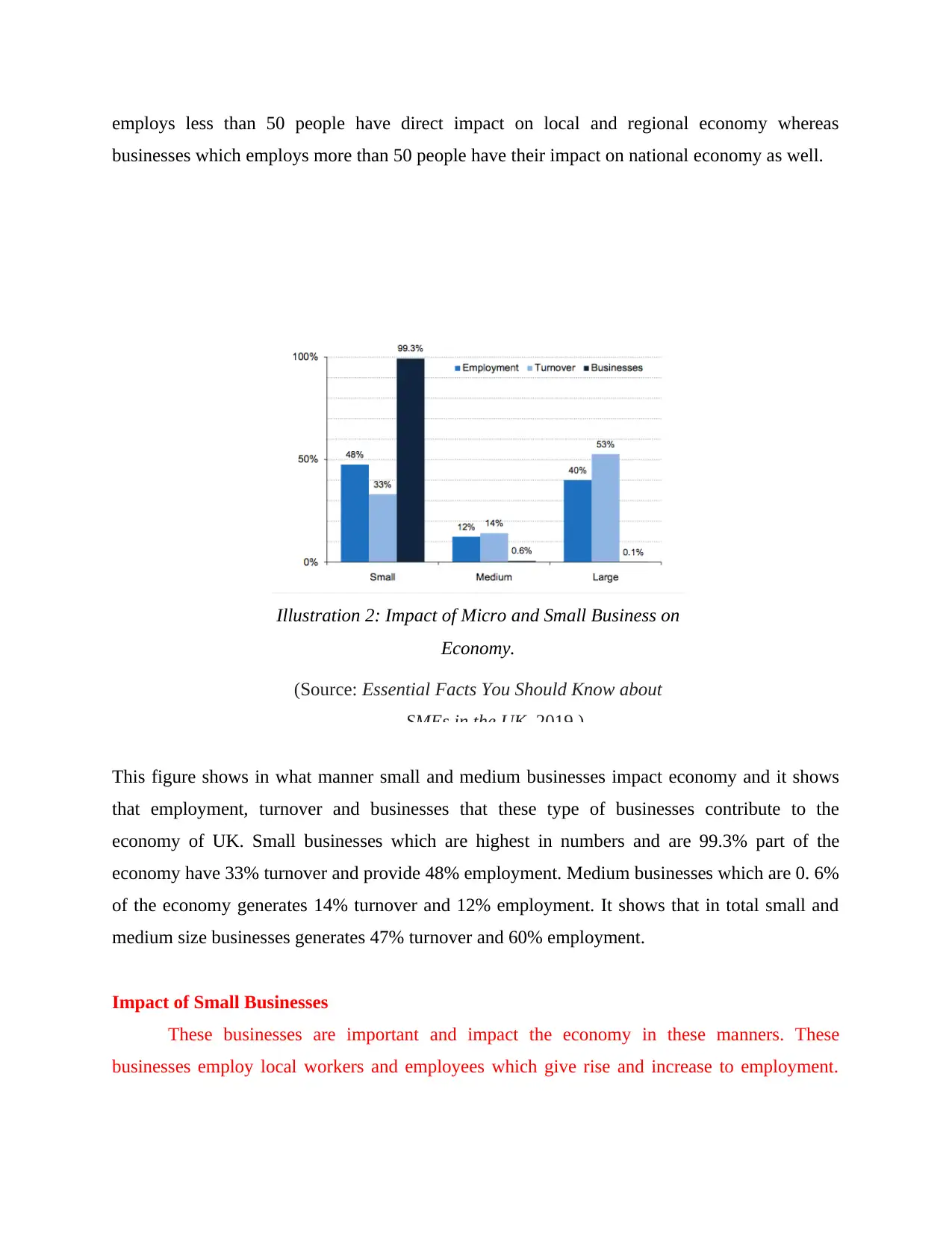
employs less than 50 people have direct impact on local and regional economy whereas
businesses which employs more than 50 people have their impact on national economy as well.
This figure shows in what manner small and medium businesses impact economy and it shows
that employment, turnover and businesses that these type of businesses contribute to the
economy of UK. Small businesses which are highest in numbers and are 99.3% part of the
economy have 33% turnover and provide 48% employment. Medium businesses which are 0. 6%
of the economy generates 14% turnover and 12% employment. It shows that in total small and
medium size businesses generates 47% turnover and 60% employment.
Impact of Small Businesses
These businesses are important and impact the economy in these manners. These
businesses employ local workers and employees which give rise and increase to employment.
Illustration 2: Impact of Micro and Small Business on
Economy.
(Source: Essential Facts You Should Know about
SMEs in the UK, 2019.)
businesses which employs more than 50 people have their impact on national economy as well.
This figure shows in what manner small and medium businesses impact economy and it shows
that employment, turnover and businesses that these type of businesses contribute to the
economy of UK. Small businesses which are highest in numbers and are 99.3% part of the
economy have 33% turnover and provide 48% employment. Medium businesses which are 0. 6%
of the economy generates 14% turnover and 12% employment. It shows that in total small and
medium size businesses generates 47% turnover and 60% employment.
Impact of Small Businesses
These businesses are important and impact the economy in these manners. These
businesses employ local workers and employees which give rise and increase to employment.
Illustration 2: Impact of Micro and Small Business on
Economy.
(Source: Essential Facts You Should Know about
SMEs in the UK, 2019.)
⊘ This is a preview!⊘
Do you want full access?
Subscribe today to unlock all pages.

Trusted by 1+ million students worldwide
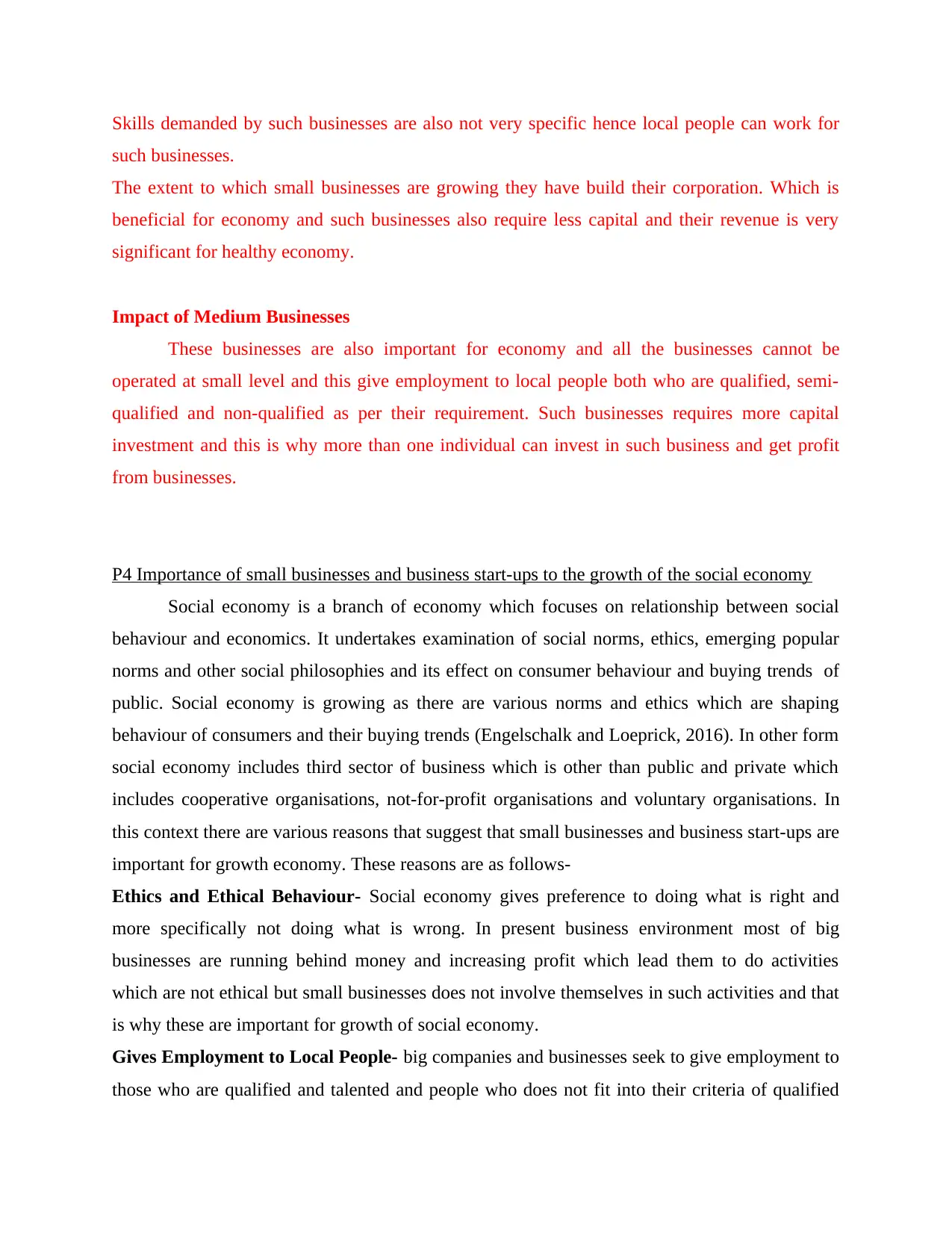
Skills demanded by such businesses are also not very specific hence local people can work for
such businesses.
The extent to which small businesses are growing they have build their corporation. Which is
beneficial for economy and such businesses also require less capital and their revenue is very
significant for healthy economy.
Impact of Medium Businesses
These businesses are also important for economy and all the businesses cannot be
operated at small level and this give employment to local people both who are qualified, semi-
qualified and non-qualified as per their requirement. Such businesses requires more capital
investment and this is why more than one individual can invest in such business and get profit
from businesses.
P4 Importance of small businesses and business start-ups to the growth of the social economy
Social economy is a branch of economy which focuses on relationship between social
behaviour and economics. It undertakes examination of social norms, ethics, emerging popular
norms and other social philosophies and its effect on consumer behaviour and buying trends of
public. Social economy is growing as there are various norms and ethics which are shaping
behaviour of consumers and their buying trends (Engelschalk and Loeprick, 2016). In other form
social economy includes third sector of business which is other than public and private which
includes cooperative organisations, not-for-profit organisations and voluntary organisations. In
this context there are various reasons that suggest that small businesses and business start-ups are
important for growth economy. These reasons are as follows-
Ethics and Ethical Behaviour- Social economy gives preference to doing what is right and
more specifically not doing what is wrong. In present business environment most of big
businesses are running behind money and increasing profit which lead them to do activities
which are not ethical but small businesses does not involve themselves in such activities and that
is why these are important for growth of social economy.
Gives Employment to Local People- big companies and businesses seek to give employment to
those who are qualified and talented and people who does not fit into their criteria of qualified
such businesses.
The extent to which small businesses are growing they have build their corporation. Which is
beneficial for economy and such businesses also require less capital and their revenue is very
significant for healthy economy.
Impact of Medium Businesses
These businesses are also important for economy and all the businesses cannot be
operated at small level and this give employment to local people both who are qualified, semi-
qualified and non-qualified as per their requirement. Such businesses requires more capital
investment and this is why more than one individual can invest in such business and get profit
from businesses.
P4 Importance of small businesses and business start-ups to the growth of the social economy
Social economy is a branch of economy which focuses on relationship between social
behaviour and economics. It undertakes examination of social norms, ethics, emerging popular
norms and other social philosophies and its effect on consumer behaviour and buying trends of
public. Social economy is growing as there are various norms and ethics which are shaping
behaviour of consumers and their buying trends (Engelschalk and Loeprick, 2016). In other form
social economy includes third sector of business which is other than public and private which
includes cooperative organisations, not-for-profit organisations and voluntary organisations. In
this context there are various reasons that suggest that small businesses and business start-ups are
important for growth economy. These reasons are as follows-
Ethics and Ethical Behaviour- Social economy gives preference to doing what is right and
more specifically not doing what is wrong. In present business environment most of big
businesses are running behind money and increasing profit which lead them to do activities
which are not ethical but small businesses does not involve themselves in such activities and that
is why these are important for growth of social economy.
Gives Employment to Local People- big companies and businesses seek to give employment to
those who are qualified and talented and people who does not fit into their criteria of qualified
Paraphrase This Document
Need a fresh take? Get an instant paraphrase of this document with our AI Paraphraser
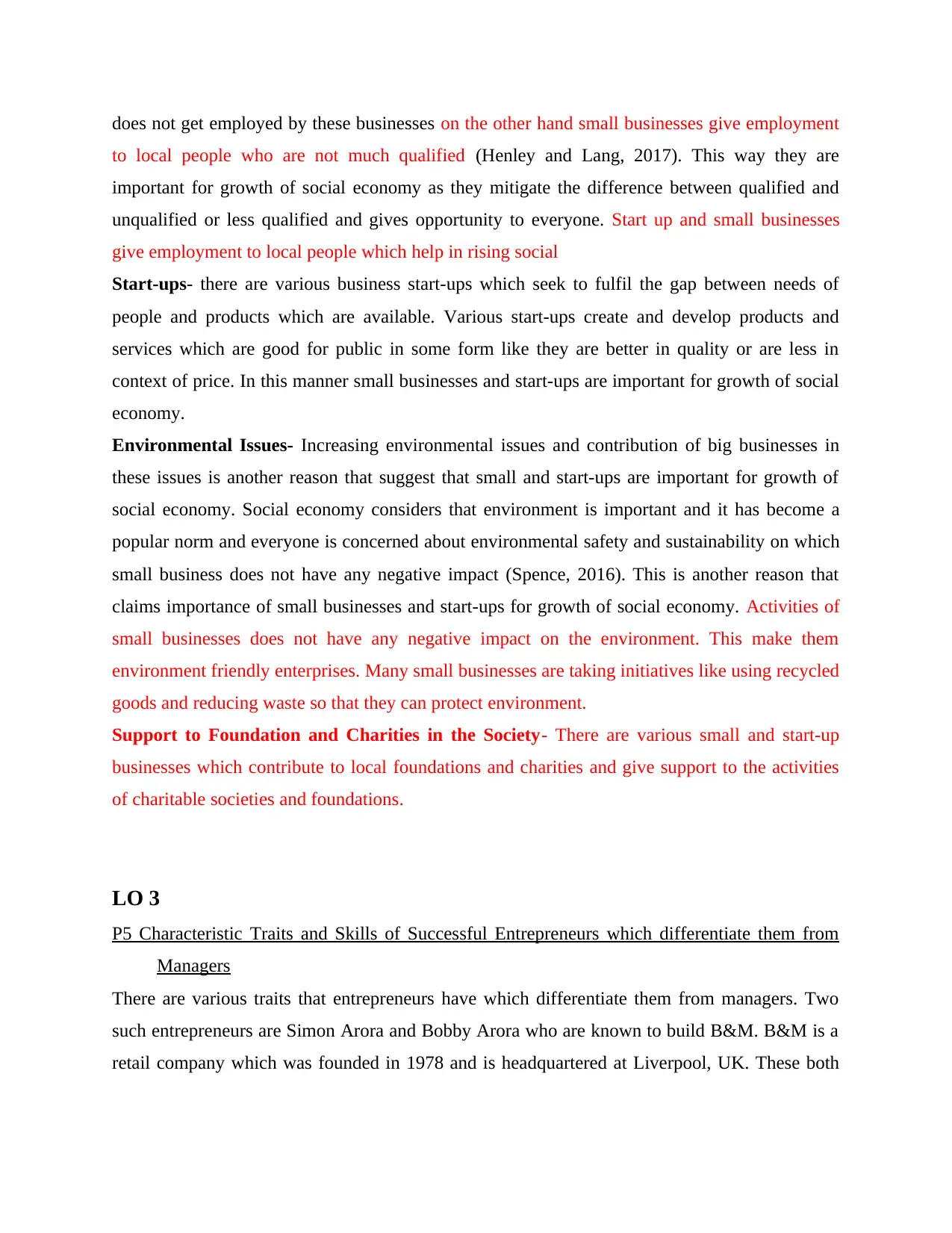
does not get employed by these businesses on the other hand small businesses give employment
to local people who are not much qualified (Henley and Lang, 2017). This way they are
important for growth of social economy as they mitigate the difference between qualified and
unqualified or less qualified and gives opportunity to everyone. Start up and small businesses
give employment to local people which help in rising social
Start-ups- there are various business start-ups which seek to fulfil the gap between needs of
people and products which are available. Various start-ups create and develop products and
services which are good for public in some form like they are better in quality or are less in
context of price. In this manner small businesses and start-ups are important for growth of social
economy.
Environmental Issues- Increasing environmental issues and contribution of big businesses in
these issues is another reason that suggest that small and start-ups are important for growth of
social economy. Social economy considers that environment is important and it has become a
popular norm and everyone is concerned about environmental safety and sustainability on which
small business does not have any negative impact (Spence, 2016). This is another reason that
claims importance of small businesses and start-ups for growth of social economy. Activities of
small businesses does not have any negative impact on the environment. This make them
environment friendly enterprises. Many small businesses are taking initiatives like using recycled
goods and reducing waste so that they can protect environment.
Support to Foundation and Charities in the Society- There are various small and start-up
businesses which contribute to local foundations and charities and give support to the activities
of charitable societies and foundations.
LO 3
P5 Characteristic Traits and Skills of Successful Entrepreneurs which differentiate them from
Managers
There are various traits that entrepreneurs have which differentiate them from managers. Two
such entrepreneurs are Simon Arora and Bobby Arora who are known to build B&M. B&M is a
retail company which was founded in 1978 and is headquartered at Liverpool, UK. These both
to local people who are not much qualified (Henley and Lang, 2017). This way they are
important for growth of social economy as they mitigate the difference between qualified and
unqualified or less qualified and gives opportunity to everyone. Start up and small businesses
give employment to local people which help in rising social
Start-ups- there are various business start-ups which seek to fulfil the gap between needs of
people and products which are available. Various start-ups create and develop products and
services which are good for public in some form like they are better in quality or are less in
context of price. In this manner small businesses and start-ups are important for growth of social
economy.
Environmental Issues- Increasing environmental issues and contribution of big businesses in
these issues is another reason that suggest that small and start-ups are important for growth of
social economy. Social economy considers that environment is important and it has become a
popular norm and everyone is concerned about environmental safety and sustainability on which
small business does not have any negative impact (Spence, 2016). This is another reason that
claims importance of small businesses and start-ups for growth of social economy. Activities of
small businesses does not have any negative impact on the environment. This make them
environment friendly enterprises. Many small businesses are taking initiatives like using recycled
goods and reducing waste so that they can protect environment.
Support to Foundation and Charities in the Society- There are various small and start-up
businesses which contribute to local foundations and charities and give support to the activities
of charitable societies and foundations.
LO 3
P5 Characteristic Traits and Skills of Successful Entrepreneurs which differentiate them from
Managers
There are various traits that entrepreneurs have which differentiate them from managers. Two
such entrepreneurs are Simon Arora and Bobby Arora who are known to build B&M. B&M is a
retail company which was founded in 1978 and is headquartered at Liverpool, UK. These both
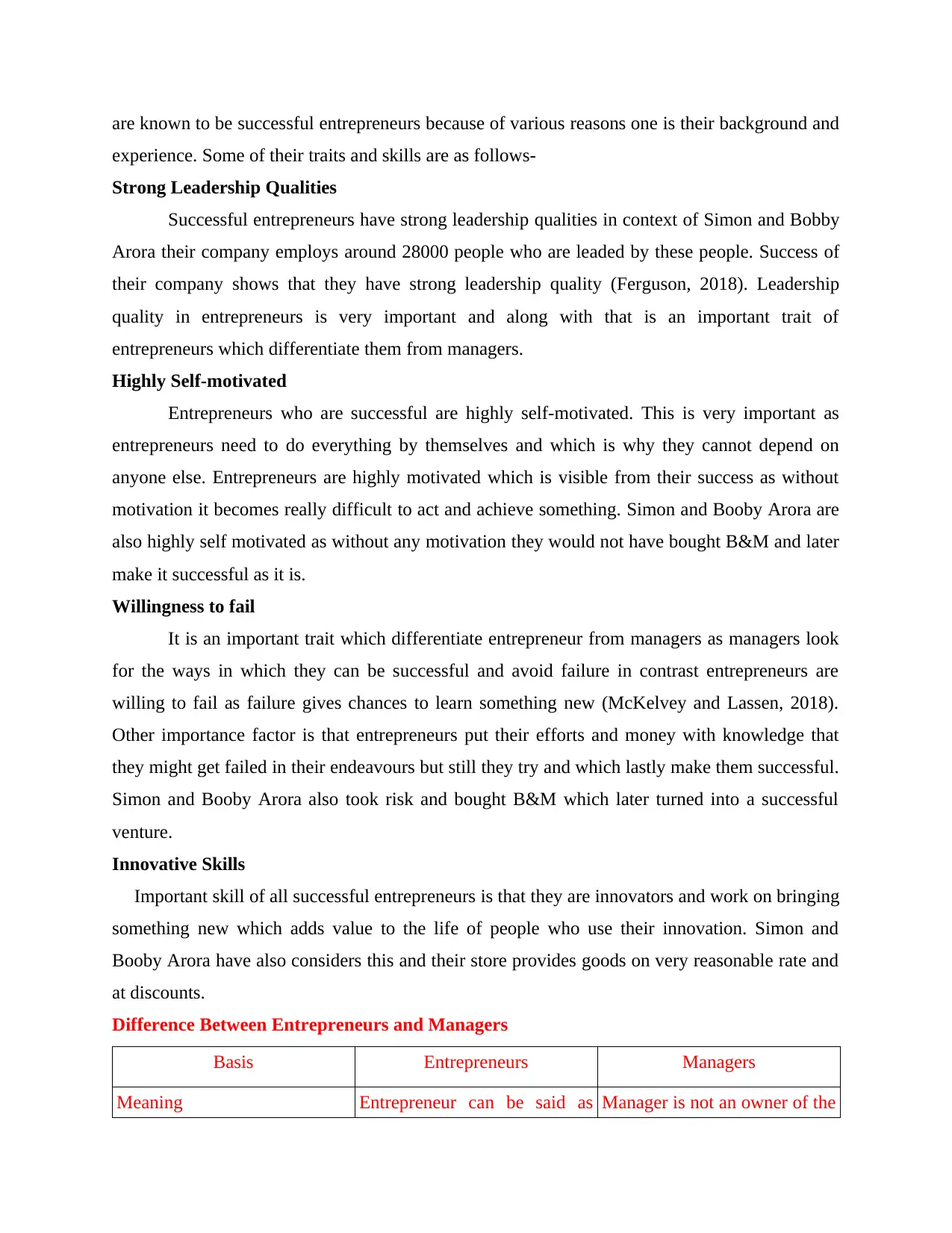
are known to be successful entrepreneurs because of various reasons one is their background and
experience. Some of their traits and skills are as follows-
Strong Leadership Qualities
Successful entrepreneurs have strong leadership qualities in context of Simon and Bobby
Arora their company employs around 28000 people who are leaded by these people. Success of
their company shows that they have strong leadership quality (Ferguson, 2018). Leadership
quality in entrepreneurs is very important and along with that is an important trait of
entrepreneurs which differentiate them from managers.
Highly Self-motivated
Entrepreneurs who are successful are highly self-motivated. This is very important as
entrepreneurs need to do everything by themselves and which is why they cannot depend on
anyone else. Entrepreneurs are highly motivated which is visible from their success as without
motivation it becomes really difficult to act and achieve something. Simon and Booby Arora are
also highly self motivated as without any motivation they would not have bought B&M and later
make it successful as it is.
Willingness to fail
It is an important trait which differentiate entrepreneur from managers as managers look
for the ways in which they can be successful and avoid failure in contrast entrepreneurs are
willing to fail as failure gives chances to learn something new (McKelvey and Lassen, 2018).
Other importance factor is that entrepreneurs put their efforts and money with knowledge that
they might get failed in their endeavours but still they try and which lastly make them successful.
Simon and Booby Arora also took risk and bought B&M which later turned into a successful
venture.
Innovative Skills
Important skill of all successful entrepreneurs is that they are innovators and work on bringing
something new which adds value to the life of people who use their innovation. Simon and
Booby Arora have also considers this and their store provides goods on very reasonable rate and
at discounts.
Difference Between Entrepreneurs and Managers
Basis Entrepreneurs Managers
Meaning Entrepreneur can be said as Manager is not an owner of the
experience. Some of their traits and skills are as follows-
Strong Leadership Qualities
Successful entrepreneurs have strong leadership qualities in context of Simon and Bobby
Arora their company employs around 28000 people who are leaded by these people. Success of
their company shows that they have strong leadership quality (Ferguson, 2018). Leadership
quality in entrepreneurs is very important and along with that is an important trait of
entrepreneurs which differentiate them from managers.
Highly Self-motivated
Entrepreneurs who are successful are highly self-motivated. This is very important as
entrepreneurs need to do everything by themselves and which is why they cannot depend on
anyone else. Entrepreneurs are highly motivated which is visible from their success as without
motivation it becomes really difficult to act and achieve something. Simon and Booby Arora are
also highly self motivated as without any motivation they would not have bought B&M and later
make it successful as it is.
Willingness to fail
It is an important trait which differentiate entrepreneur from managers as managers look
for the ways in which they can be successful and avoid failure in contrast entrepreneurs are
willing to fail as failure gives chances to learn something new (McKelvey and Lassen, 2018).
Other importance factor is that entrepreneurs put their efforts and money with knowledge that
they might get failed in their endeavours but still they try and which lastly make them successful.
Simon and Booby Arora also took risk and bought B&M which later turned into a successful
venture.
Innovative Skills
Important skill of all successful entrepreneurs is that they are innovators and work on bringing
something new which adds value to the life of people who use their innovation. Simon and
Booby Arora have also considers this and their store provides goods on very reasonable rate and
at discounts.
Difference Between Entrepreneurs and Managers
Basis Entrepreneurs Managers
Meaning Entrepreneur can be said as Manager is not an owner of the
⊘ This is a preview!⊘
Do you want full access?
Subscribe today to unlock all pages.

Trusted by 1+ million students worldwide
1 out of 18
Related Documents
Your All-in-One AI-Powered Toolkit for Academic Success.
+13062052269
info@desklib.com
Available 24*7 on WhatsApp / Email
![[object Object]](/_next/static/media/star-bottom.7253800d.svg)
Unlock your academic potential
Copyright © 2020–2026 A2Z Services. All Rights Reserved. Developed and managed by ZUCOL.





